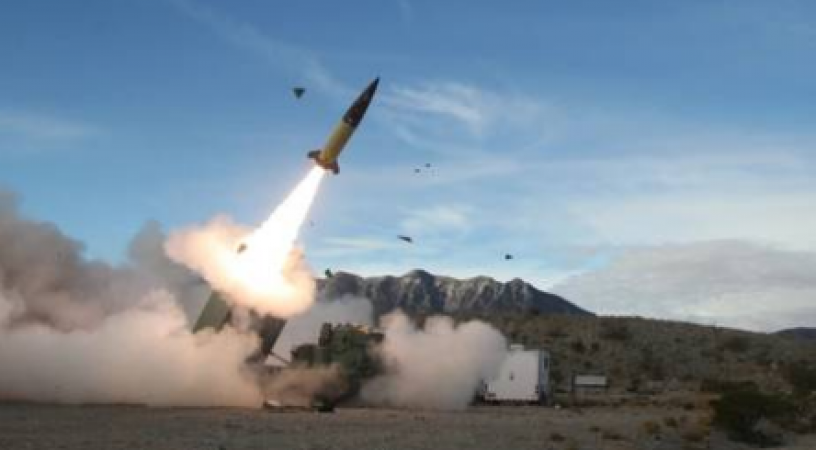
Washington: United States is reportedly on the brink of granting approval for shipments of longer-range missiles equipped with cluster munitions to Ukraine, according to Reuters. This move comes after a prolonged period of US resistance to Ukraine's requests for such weaponry, citing concerns that they could potentially be used for strikes deep inside Russia.
Unnamed US officials, cited by Reuters, have disclosed that the White House is close to authorizing the transfer of either Army Tactical Missile Systems (ATACMS) or Guided Multiple Launch Rocket System (GMLRS) missiles, or possibly both, to Ukraine. While the timing of the final decision remains uncertain, these sources indicate that the missiles could be included in the next weapons shipment to Ukraine, potentially as early as this week.
The ATACMS missile boasts an impressive range of 190 miles (306 km), making it the longest-range US system ever considered for supply to Ukraine. Meanwhile, the GMLRS missile can strike targets up to 45 miles (72 km) away. Both of these missiles have the capability to be equipped with cluster munitions, a type of weaponry that has been included in past US arms packages to Ukraine.
Also Read: Israel Extends US Visa-Waiver Program to Include Gaza Americans, Welcomed by Biden Administration
Ukraine's persistent requests for longer-range missiles have been a recurring theme throughout the conflict with Russia. However, until now, such demands have been met with reluctance from the US, which has expressed concerns about the potential consequences of facilitating strikes deep inside Russian territory, particularly in regions like Crimea.
The change in the US stance on this matter is notable, as National Security Advisor Jake Sullivan had previously suggested that supplying ATACMS missiles could risk escalating the situation and even lead to a "third world war." The president was said to be "not prepared to provide" that capability at the time. However, the recent shift in policy reflects a reassessment of the situation in the intervening months.
One factor cited for the earlier hesitation was the perceived shortage of ATACMS missiles within US inventories. Yet, recent reports indicate that there is now a surplus of these missiles available, surpassing the initial assessments of availability.
The proposed arms shipment, if ultimately authorized, would draw from existing US stockpiles under the Presidential Drawdown Authority. Since February 2022, the Biden administration has already approved nearly $44 billion in weapons for Ukraine, in addition to substantial funding under the separate Ukraine Security Assistance Initiative, which channels government funds to private arms contractors.
Also Read: Morocco Decides to Proceed with IMF after Earthquake
Cluster munitions, included in the arsenal of these longer-range missiles, consist of smaller explosive submunitions, often used against personnel and light vehicles. However, due to their tendency to leave behind undetonated submunitions, known as 'duds,' which can remain active in former conflict zones for decades, more than 120 nations have committed to banning these weapons. This ban includes most NATO members. Nevertheless, the United States, Russia, and Ukraine have not signed the international treaty prohibiting the use of cluster munitions.
In response to Western arms deliveries to Ukraine, Moscow has repeatedly voiced its condemnation, asserting that such actions could provoke a significant escalation and perpetuate the ongoing conflict. Russia's Deputy Envoy to the UN, Dmitry Polyansky, warned on a recent occasion that "anything" could transpire amid an "intense proxy standoff between NATO and Russia," underscoring the volatility of the situation.
The reported US consideration to supply longer-range missiles equipped with cluster munitions to Ukraine takes place against the backdrop of ongoing geopolitical tensions in the region. This development carries multiple dimensions, from addressing Ukraine's security needs to potential implications for regional stability and international relations.
Ukraine's requests for longer-range missiles are a reflection of the country's persistent security concerns amid the ongoing conflict with Russia. The ability to possess and utilize such weaponry would undoubtedly enhance Ukraine's defensive capabilities. The inclusion of cluster munitions in these missiles adds an additional layer of complexity to the decision, given the controversy and risks associated with their use.
The change in the US stance, as indicated by this potential approval, highlights a reassessment of the evolving security landscape in Eastern Europe. While previous concerns about escalation and global implications were paramount, the recognition of surplus missile availability and potentially evolving security dynamics appear to have influenced the policy shift.
The inclusion of cluster munitions in the proposed missile shipments underscores the broader debate surrounding these weapons. The decision to supply them raises ethical and humanitarian concerns, given their potential to cause harm to civilian populations and leave behind hazardous unexploded submunitions.
Russia's consistent opposition to Western arms deliveries to Ukraine remains a critical aspect of this situation. Moscow's warnings of potential escalation highlight the sensitivity of the region and the potential for further destabilization.
The decision to provide longer-range missiles to Ukraine could have implications for the broader region. It may prompt neighboring countries to reassess their own security strategies and alliances, potentially impacting the overall balance of power in Eastern Europe.
This development reaffirms the United States' commitment to supporting its allies and partners in the region. It underscores Washington's role as a key player in the complex dynamics of Eastern Europe.
Also Read: Historic Deal: $6 Billion Transfer Paves Way for Release of Detainees
As this decision evolves and its implications become clearer, it will continue to be a focal point in the ongoing efforts to address the complexities of the Ukrainian conflict and its broader geopolitical ramifications. The balance between addressing Ukraine's security needs and managing regional stability remains a delicate and multifaceted challenge for policymakers